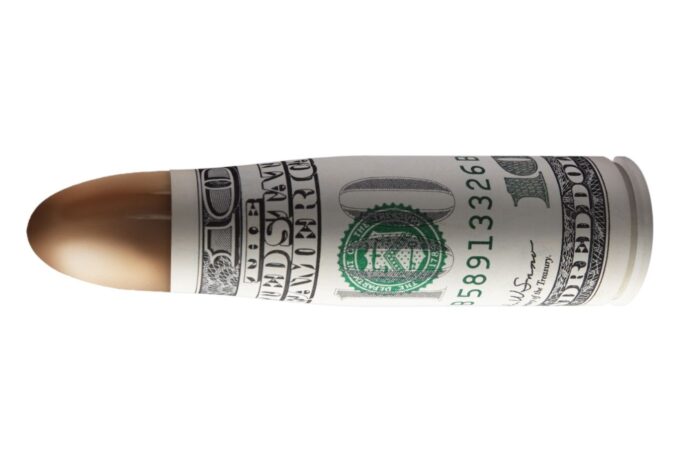When the Secure and Fair Enforcement (SAFE) Banking Act was introduced in 2017, both Democrats and Republicans were optimistic Congress would pass the bill, allowing financial services for an industry generating billions of dollars in revenues and adding tens of millions of dollars to state tax coffers.
Since then, SAFE has bounced around in various House and Senate committees and passed in the House seven times. Recently, a slightly modified version was reintroduced in the Senate as the Secure and Fair Enforcement Regulation (SAFER) Banking Act.
For any other industry that generates billions of dollars, the idea of conducting transactions only in cash would be absurd. Yet, this has been the day-to-day reality for most businesses in the legal cannabis industry for more than a quarter century. More than six years after Senator Jeff Merkley (D-OR) and former Representative Ed Perlmutter (D-CO) introduced SAFE, cannabis companies are still lugging around bags of cash like it’s 1999.
So now that the Senate bill is “SAFER,” will politicians finally push the legislation through and allow the industry access to the same types of banking services every other major industry in the United States enjoys?
Don’t hold your breath.
“What they’re really trying to do is make sure money-laundering isn’t taking place and there’s still enough oversight,” said Rachel Gillette, a partner at Holland & Hart LLP and leader of the law firm’s cannabis and psychedelics practice group. “They want to make sure there isn’t a loophole that allows banks to work with just anybody. I think that’s what the debate is primarily about and explains the changes that were added.”
One of the bill’s new provisions mandates the director of the Financial Crimes Enforcement Network (FinCEN) testify before Congress about the agency’s efforts to prevent money-laundering within one year of the legislation’s enactment. The new bill also adds federal mortgage lenders to a list of financial institutions that would be protected from penalties levied by federal banking regulators.
Because numerous federal agencies oversee banking, there has been no shortage of amendments to the beleaguered bill. But if and when Congress gets back to business, cannabis companies finally will be able to:
- Open a bank account and have confidence it won’t be closed the following week.
- Conduct transactions through credit card networks.
- Pay employees and conduct most business transactions through traditional financial networks.
- Pay the Internal Revenue Service without making an appointment months ahead of time and toting around duffle bags full of cash or dozens of money orders.
- Secure business loans through traditional channels.
- Access larger banks that, ideally, will compete for and court new clients.
So that’s the carrot. Ready for the stick?
“My hope is if SAFER Banking does pass, it will drive some of the costs down,” said Gillette. “But just to add insult to injury, the IRS may take all your banking fees and say they’re disallowed under [Internal Revenue Code Section] 280E, so bank fee expenses might not be allowed and will be taxed as income. It all depends on how the IRS is feeling that day whether they’ll allow that deduction or not. But during audits, I’ve definitely seen revenue agents take the position that banking fees are not related to production and therefore not allowed to be deducted as cost of goods sold.”
Section 280E disallows the deduction of most normal and ordinary business expenses for the production, distribution, and sale of substances listed on Schedule I or II of the federal Controlled Substances Act. Cannabis resides on Schedule I.
While large, well-funded companies that generate significant revenues have found banks willing to work with them, many small and medium-sized operators have been shut out of the system. Companies that do have bank accounts, and their banks, are subject to specialized oversight programs requiring mountains of paperwork and reporting under FinCEN.
Because of all the compliance paperwork, banks charge cannabis companies an additional monthly service fee (typically $500 to $1,500 per month, depending on the company’s size), deposit fees, transaction fees, et cetera. Banked businesses can end up paying “tens of thousands of dollars in fees every year,” Gillette said.
So, if the SAFER Banking Act passes, that’s what businesses may have to look forward to if they decide to establish banking relationships.
“I’m a little bit dubious that [the bill will pass] anytime soon,” said Gillette. “I tend to be very much an optimist, but after fourteen years working in this industry and not seeing any changes federally, I’m having less and less faith in things actually changing.”













[…] cannabis industry has slowed due to a combination of stifling regulations, economic uncertainty, lack of access to capital, and restrictive banking options. Nevertheless, skilled investors still can capitalize on […]
[…] cannabis industry has slowed due to a combination of stifling regulations, economic uncertainty, lack of access to capital, and restrictive banking options. Nevertheless, skilled investors still can capitalize on […]
[…] banking reform historically have struggled in the Senate, the House has passed a version of the SAFE(R) Banking Act seven times. But in an election year that’s extremely polarized, any measure that could be […]
[…] than any of us anticipated. At this point, I think the major industry focus is on rescheduling and the banking bill. If we could get those two things done, that would free up a lot of capital and infuse some new […]
[…] could negatively impact how your business takes shape and grows in the future—especially with the SAFER Banking Act and federal rescheduling in […]
[…] politicians on both sides of the aisle were more open than ever to meeting with lobbyists about banking reform, releasing the unjustly incarcerated, federal taxation, and all the other potential benefits and […]
[…] reforms such as the SAFER Banking Act and rescheduling cannabis under the Controlled Substances Act would improve certain aspects of this […]
[…] cannabis industry has slowed due to a combination of stifling regulations, economic uncertainty, lack of access to capital, and restrictive banking options. Nevertheless, skilled investors still can capitalize on […]
[…] like the Secure and Fair Enforcement Regulation (SAFER) Banking Act have been making the rounds in Congress for several years, and both industry operators and […]
[…] passed out of the Senate Banking Committee in a historic bipartisan move. If it advances, the SAFER Banking Act would open the doors for established players in traditional retail and banking to enter the U.S. […]
[…] lobbying clout on Capitol Hill. Although the organization’s two big issues from the beginning—banking and Internal Revenue Code Section 280E—remain unresolved, Smith said politicians’ attitudes […]